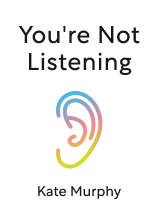

This article is an excerpt from the Shortform book guide to "You're Not Listening" by Kate Murphy. Shortform has the world's best summaries and analyses of books you should be reading.
Like this article? Sign up for a free trial here.
Do you listen as well as you think you do? Why is it important to listen? What might you be missing out on?
Listening is far more than just hearing what people say. Effective listening creates meaningful connections between you and others, fosters learning and growth, and enables cooperation. In other words, listening well simply makes life better.
Keep reading to learn why it is important to listen.
Why It Is Important to Listen
Most people understand listening as simply hearing someone talk. However, Murphy advocates a more developed model of listening that we’ll call effective listening. Effective listening goes far beyond merely processing someone’s words. It requires prioritizing the speaker and helping them feel heard. It requires reading their body language, encouraging them to continue sharing, and putting your assumptions aside. Effective listening includes trying to understand how the speaker is feeling and why they’re trying to share something with you.
Many find effective listening challenging. But, according to Murphy, it’s well worth the effort. She explains why it is important to listen, noting three main benefits of effective listening: creating connections, fostering growth, and enabling cooperation.
(Shortform note: It’s likely that you think you already participate in effective listening, but researchers have found that many people overestimate their listening abilities. One study found that over 96% of survey respondents consider themselves “good listeners.” However, when tested, the average person retains only about half of what they hear. This suggests a widespread need for developing listening as a skill.)
Benefit #1: Effective Listening Creates Connections
Murphy explains that effective listening creates empathic connections between people. Scientific research shows that listening causes the brain waves of both the listener and speaker to start mirroring each other. This attunement creates strong feelings of personal connection that enable both speaker and listener to feel each others’ emotions and develop an empathic bond. Murphy explores three core benefits of these empathic connections.
1) Creating Connections Alleviates Loneliness
Creating connections has the power to help us overcome loneliness. Murphy explains that people feel lonely when they’re emotionally disconnected from others. This could be either because they’re physically isolated, or because they’re unable to connect with others around them. Because effective listening forges empathic connections at the neurological level, it has the power to alleviate emotional isolation and loneliness.
2) Creating Connections Strengthens Intimate Relationships
Strong connections have the power to build more satisfying intimate relationships. Murphy explains that the deeper connections that come from effective listening enable trust: People are more likely to trust someone if they believe that person understands their feelings. Because effective listening allows you to understand someone else’s feelings on a deeper level, this will increase the likelihood that they’ll trust you.
Furthermore, Murphy states that trust is one of the most important foundations for a satisfying romantic relationship. Relationships without this foundation are more likely to fail.
3) Creating Connections Supports Healthy Development in Children
By forging strong connections through effective listening, parents can help their children grow into healthier adults. Murphy explains that children need to feel heard to build trusting relationships with their parents. When children grow up, their relationships with their parents will form the template for their future relationships with others. Children who don’t form strong connections with their parents may struggle to form strong connections with others later in life.
Benefit #2: Effective Listening Fosters Growth
Murphy explains that, beyond creating strong connections, effective listening leads to learning and growth for both the listener and the speaker.
1) Effective Listening Helps the Listener Learn and Grow
Listening to others helps you learn more about people and the world around you—leading to a more interesting life with more personal growth. Murphy states that when you talk about yourself, you’re only talking about things you already know. However, when you listen to others, you also get to hear about things you don’t already know. This has the potential to help you grow in three ways.
1) By considering ideas that wouldn’t have occurred to you, you develop new perspectives and come to new understandings that you wouldn’t have reached on your own.
2) Discovering new points of view allows you to challenge your own beliefs. This has the power to help you discover errors in your thinking and make you more secure in your convictions. Murphy explains that we’re most afraid of our ideas being challenged when they’re untested. By testing your own beliefs, you can become less afraid of these challenges. This will actually make you more secure in your beliefs because you know they can stand up to challenge.
3) Listening to others can enrich your inner voice. People’s inner voices typically pull from the voices they’ve listened to throughout their lives—such as parents, teachers, or close friends. By listening effectively to people, you can bring a greater variety of perspectives and wisdom to this inner voice.
2) Effective Listening Helps the Speaker Learn and Grow
Murphy also states that being effectively listened to can help the speaker learn and grow by providing an opportunity to process and solve their own problems. Recall that listening builds trust between both parties. When the speaker feels they can trust their listener, it allows them to open up and explore their thoughts and feelings in greater depth.
By talking about their feelings in greater depth, the speaker has the opportunity to process problems, see new solutions, or come to a deeper understanding of themselves. All of these can aid the speaker in their personal growth by helping them to better understand their needs and challenges in life.
Benefit #3: Effective Listening Enables Cooperation
Finally, Murphy argues that listening enables cooperation. Recall that effective listening allows the speaker to open up and share things they might not normally share. This helps the listener and speaker find common ground and discover opportunities for compromise—which, in turn, allows for greater cooperation, collaboration, and coalition-building.
(Shortform note: Listening also enables cooperation because it impacts people’s moods. Researchers have found that whether someone cooperates is heavily determined by their emotional state and previous experience with cooperation. This contradicts previous social theories that maintained that individuals cooperate largely based on their self-interests. Recall that listening effectively to someone has the power to give them a sense of connection and validation. Because these feelings will improve their mood, this can also increase their willingness to collaborate.)

———End of Preview———
Like what you just read? Read the rest of the world's best book summary and analysis of Kate Murphy's "You're Not Listening" at Shortform.
Here's what you'll find in our full You're Not Listening summary:
- A look at how listening skills are disappearing throughout society
- How to become a better, more effective listener
- Why it's easier to listen to strangers than to those close to you






